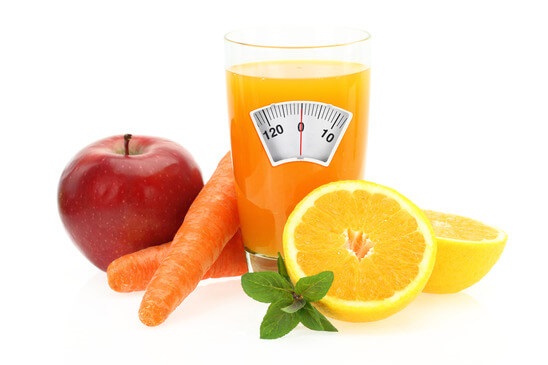
We all agree that a diet rich in fresh fruits and veggies can reduce the risk of certain chronic diseases and protect against some types of cancers. However, eating healthy is not always easy. Our lives are becoming increasingly busy and a quick dinner is always just around the corner.
That’s why many people turn to freshly pressed juices. After all, they are being advertised by numerous celebrities as miracle potions that help you lose weight, cure any disease, and “flush out the toxins” from your body.
Now, the question is:
Is juicing really as healthy as they say?
To answer this question, let’s take a look at two of the most popular juicing myths.

Myth #1: A Juice Cleanse Is Necessary for Detoxing Your Body
Juice cleanses are often touted as the best way to refresh your body, especially after the holidays. These cleanses are said to help “flush out the toxins” that can cause digestive problems, weight gain, and feelings of low energy and fatigue.
Do You Really Need to Detox?
Contrary to what celebrities tell you – you don’t need a juice fast to detox your body!
That’s because your body already has a built-in detox system (your liver, kidneys, etc.) that works hard day and night to cleanse itself all without the need of a special diet. You can detox your body daily by living green and healthy!
The Detox Process
Detoxifying is a complicated process that occurs in two phases, both of which require optimal nutrients. Among those nutrients are amino acids, building blocks of most biological processes in our body, which are almost always absent in fruit and vegetable juices. For that reason only, the claim that juices help with detoxification is flawed on many levels.
In addition to that, when you cut out whole food groups from your diet, your body may not get other important nutrients it needs to perform properly. Using juices as meal replacements can actually cause your detox goals to backfire!
Although juicing is not necessary for detoxing your body, it doesn’t mean you can’t give your kidneys and liver a helping hand. If you do want to include juicing in your lifestyle, make sure you throw mostly vegetables in your juicer and that you also include healthy fats and proteins in them.
Myth #2: Juice Diets Are the Best Way to Lose Weight

Juice diets often promise rapid weight loss and in this day and age, who doesn’t want a quick fix to their weight problem? There is no doubt that if you eliminate all solid foods from your diet and consume only fruit juices, you will lose weight. In fact, you can even lose up to one pound per day!
Is Juicing Really the Best Way to Lose Weight?
Again, the short answer is no.
The weight you lose during a 7-day juice diet is mostly lean body mass and water weight, not fat. While it can be encouraging to see the number on your scale drop, the ugly truth is, you will see it increase again in just a couple of days.
Why It’s Not Permanent
Juice diets are usually very low in calories, often between 800-1200 calories a day, which is a lot lower than your body needs to function normally. When you severely restrict your calories, your body reverts to using its energy reserves, which are stored in your muscles and liver in the form of glycogen. For every gram of glycogen your body has stored, it has also stored three grams of water. As your body burns glycogen for energy, it releases water, which is quickly gained back once you return to your normal eating habits.
What’s even worse, you miss out on important nutrients and healthy fiber and can actually slow down your metabolism as your body senses it might be starving. All that means a juice diet is not the best weight loss strategy.
Having said that, if you do want to include juicing in your weight-loss plan, you can do it without it hindering your efforts. Make sure you stick to green juices made with low-calorie vegetables like leafy greens, celery, and cucumber, and avoid drinking pure fruit juices.
Summary
Consuming fresh fruit and veggie juices is an excellent way to add lots of vitamins, minerals, anti-oxidants, and other phytonutrients to your diet. But as you can see, juice is not exactly a life-saving elixir as advertised. In fact, following juice-only cleanses and diets can actually cause more harm than good and hurt your goals in the long run!
Still, juicing can have a place in a healthy lifestyle when approached sensibly – just don’t take it to extremes.
What is your opinion on juicing?
Leave on comments and suggestions in the comment section below and please share this article!

Marla, This is a great brief overview. Totally agree with your summary. Happy New Year!
HI Nancy,
Glad you found my article helpful and that you agree with it. Thanks for stopping by and commenting. Have a healthy, happy & blessed New Year!